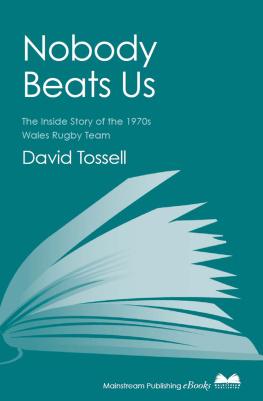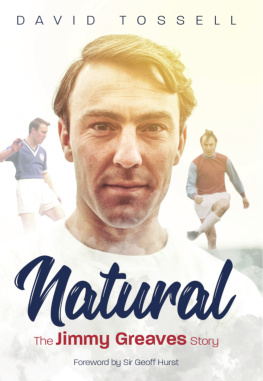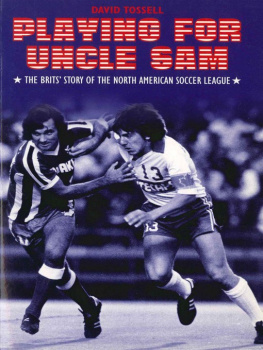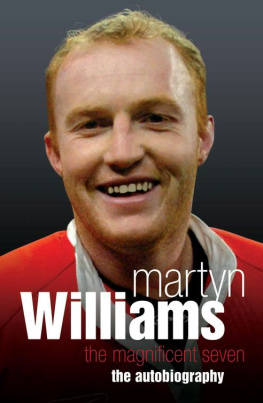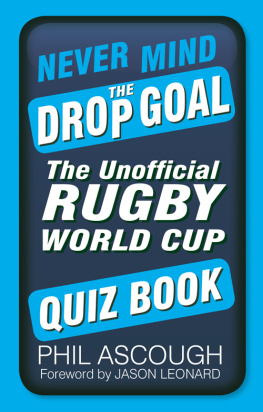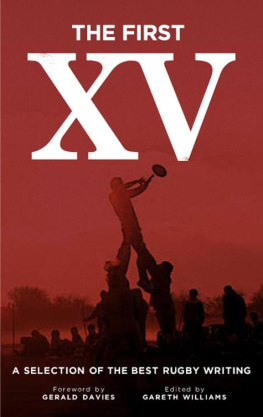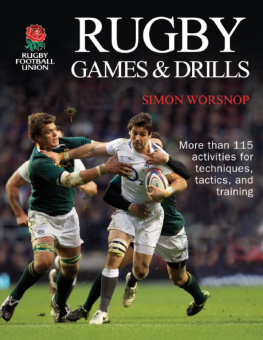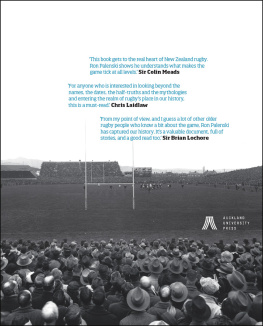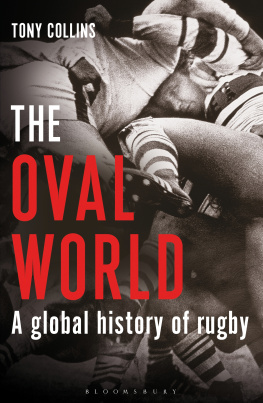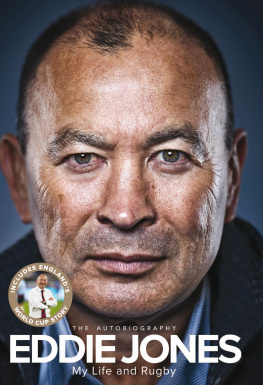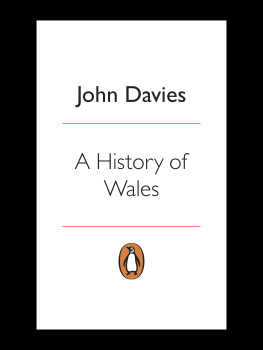About the Author
David Tossell has been a sports journalist for three decades and is director of European public affairs for the NFL. Three of his most recent publications, Nobody Beats Us, Grovel! and Bertie Mee, were nominated for British Sports Book Awards.
NOBODY BEATS US
THE INSIDE STORY OF THE 1970s WALES RUGBY TEAM
David Tossell
This eBook is copyright material and must not be copied, reproduced, transferred, distributed, leased, licenced or publicly performed or used in any way except as specifically permitted in writing by the publishers, as allowed under the terms and conditions under which it was purchased or as strictly permitted by applicable copyright law. Any unauthorised distribution or use of this text may be a direct infringement of the authors and publishers rights and those responsible may be liable in law accordingly.
Epub ISBN: 9781845969516
Version 1.0
www.mainstreampublishing.com
This edition, 2010
Copyright David Tossell, 2009
All rights reserved
The moral right of the author has been asserted
First published in Great Britain in 2009 by
MAINSTREAM PUBLISHING COMPANY
(EDINBURGH) LTD
7 Albany Street
Edinburgh EH1 3UG
ISBN 9781845967314
No part of this book may be reproduced or transmitted
in any form or by any other means without permission
in writing from the publisher, except by a reviewer
who wishes to quote brief passages in connection
with a review written for insertion in
a magazine, newspaper or broadcast
This book is a work of non-fiction based on the life, experiences and
recollections of the author. In most instances, names of people, places,
dates, sequences or the detail of events have been changed to protect
the privacy of others. The author has stated to the publishers that,
except in such respects, not affecting the substantial accuracy of
the work, the contents of this book are true
A catalogue record for this book is available
from the British Library
ACKNOWLEDGEMENTS
A ll the research material in the world, important as it is to a story like this, is nothing compared with the contribution of those who were central to the action it describes. Therefore, I am greatly indebted to those former Wales internationals of the period with whom I have spoken during the writing of this book: Phil Bennett, Tom David, Mervyn Davies, John Dawes, Gareth Edwards, Charlie Faulkner, Steve Fenwick, Stuart Gallacher, Ray Chico Hopkins, Barry John, Arthur Lewis, Brian Price, Graham Price, Derek Quinnell, Clive Rowlands, Delme Thomas, Clive Williams, J.J. Williams, J.P.R. Williams and Bobby Windsor. I am also grateful for the chance to interview Kevin Bowring, Ieuan Evans and Max Boyce.
Important thanks are due to David Power of the Welsh Charitables RFC, without whose support this project might not have got off the ground. A percentage of royalties from the book is being donated to one of the Welsh Charitables beneficiaries, the Welsh Rugby International Players Benevolent Association, whose own J.J. Williams has been a constant source of support and contacts and who generously provided a foreword. Details about both organisations can be found at the end of the book.
I am grateful to others who have contributed in a number of ways, including Alex Luff and Gwyn Dolphin at the Welsh Rugby Union, Stephanie Branston, Amanda Kirk, Haydn Parry, Neil Reynolds, Kath Thomas, Richard Whitehead and Robert Whitlock. Colorsports Andy Cowie and the staff at Getty Images and Rex Features offered their usual expert assistance in sourcing photographs, while the British Newspaper Library provided its customary efficiency. I have endeavoured in this books bibliography to acknowledge the many writers whose work has assisted my research. To everyone at Mainstream, including Bill Campbell, Iain MacGregor, Graeme Blaikie, Emily Bland and others, thanks for your backing of this project from the outset.
Final thanks, as always, to Amy, Sarah and Laura and especially to my wife Sara, who has uncomplainingly shared a year of her life with a bunch of old rugby players and is wondering who the next lodgers in our marriage will be.
FOREWORD
BY J.J. WILLIAMS, WALES AND BRITISH LIONS
T he 1970s was a memorable decade for rugby in the British Isles. In some ways it laid the foundation for the modern game as it is today. The 1971 Grand Slam was won in superb style by Wales, and that was followed by the historic victory by the British Lions in New Zealand. Interest in the game, especially by the media, had risen to new heights, and when the 74 Lions became the first team to win a series in South Africa, the BBC had at last given rugby the coverage it deserved. Players like Barry John, Gareth Edwards, J.P.R. Williams, John Dawes, Gerald Davies and Mervyn Davies became household names.
Throughout the decade, Wales was at the forefront of British rugby, and further Grand Slams were won in 1976 and 1978. It was the style of rugby played by Wales that captured the imagination of the public. New stars had emerged, like Phil Bennett, Ray Gravell, Steve Fenwick, me and the indestructible Pontypool Front Row. The key to all of this success was the flair and panache shown by the Welsh players. We also had top-class coaches such as Clive Rowlands and John Dawes, who although completely different in their styles, were leaders of the top order. Clive was the coach who would appeal to players emotions, while John was more the calm, calculating type. Of course, they had certain individuals at their disposal who were world class and also a wealth of other top players who provided enough strength in depth for Wales to remain at the top for the whole of the decade.
Having a big nucleus of players from clubs like Llanelli and London Welsh was a tremendous help and it was the style of those two famous clubs that Wales adapted during the period. We were also the first country to have organised squad coaching sessions, and the infamous training camps on the beach at Aberavon were watched by thousands of supporters, who all wanted to know what the magic formula was. Of course, there wasnt one: we simply had outstanding individuals who blended together so well. Many of the 70s team had played schoolboy rugby together and that understanding continued throughout the years.
The decade was more or less divided into two parts. The 1971 Grand Slam team had Gareth, Mervyn, JPR and Gerald as the backbone. When the new stars arrived many of them in the epic victory in Paris in 1975 it established a new regime, which was to take Wales to an even greater height. The new team won two more Grand Slams and four consecutive Triple Crowns. That record is still in place today and it will take a very special team to match that and to replicate the manner in which it was achieved.
There were some regrets for example, the fact that Wales never beat New Zealand, even though the 1978 defeat was rather questionable. Maybe Wales just never played the touring All Blacks when we were ready and prepared for them. The autumn games never had the importance granted to them back then that they have now. Also, losing the 1977 Lions series in New Zealand was a major disappointment, especially as the touring party included 18 Welsh players. The other shame is that there was no World Cup at that time. The top teams in the world were New Zealand, France and Wales and winning a Grand Slam meant that you had beaten one of the top sides to do it.

